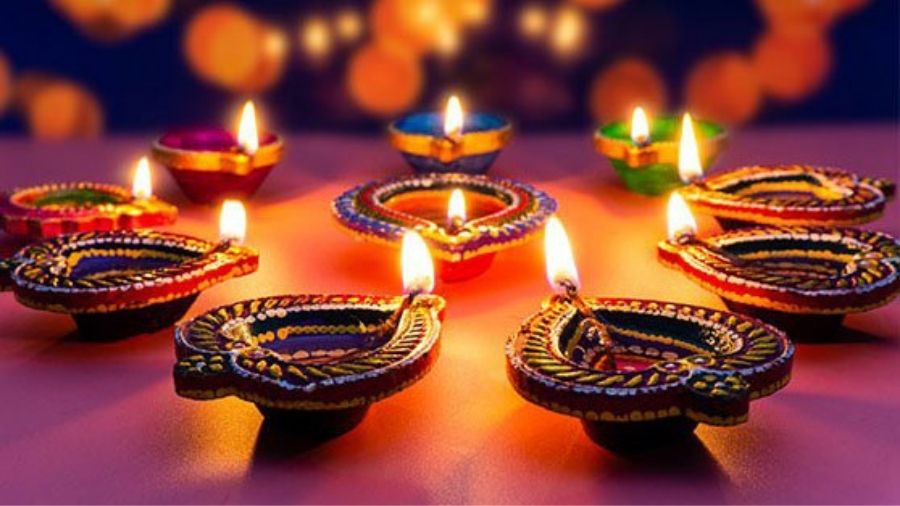At this time of the year, in our homes, lamps of various colour, size and beauty are lit to dispel darkness. Also the skies are lit up with fireworks as Deepawali is celebrated around the world among different religions and cultures. Countries like Nepal, Sri Lanka, Thailand, Malaysia, Indonesia, Singapore, Fiji, Mauritius, Trinidad, Canada and England celebrate Deepawali along with us.
Each religion is richly different with its own beautiful traditions and cultures, while the festival of Deepawali is a constant and shared celebration. Each have different reasons for celebrating Deepawali, a cosmic festival, yet they all have the concept of spirituality, peace, harmony, unity as well as celebrating the defeat of darkness and evil by God who is Light and Life.
Each religion celebrates Deepawali for different reasons, marking it differently.
Hinduism: Our Hindu brothers and sisters in north India celebrate Deepawali to rejoice the return of Lord Rama from his 14-year exile and defeating Ravana, marking the awakening of good over evil, light over darkness. In western India, it is to pay homage to and welcome Goddess Lakshmi, the goddess of wealth and prosperity and Lord Ganesha, who brings fulfilment and success to various undertakings and business. In the south, it is to celebrate the victory of Rukmini, the wife of Lord Krishna, over Narakasura, marking the triumph of women’s power. In the east, it coincides with the puja of Goddess Kali, overcoming of darkness and fear of death by her.
Jainism: To mark the spiritual awakening of their Lord Mahavira, the Jains celebrate Deepawali, marking the enlightenment of mankind from darkness.
Buddhism: Some Buddhists celebrate the festival to honour Emperor Ashoka’s decision to convert to Buddhism and follow a path of peace and enlightenment.
Sikhism: The Sikhs celebrate Deepawali to commemorate the return of their young spiritual leader Guru Hargovind Singh, the sixth Guru, to the holy city of Amritsar on release from wrongful imprisonment, symbolising understanding, peace and freedom.
Christianity: Lamps are lit up in homes symbolising evil being overcome by God, who is Light and Life and also to usher in goodness, peace, prosperity and God’s blessings. Special prayer service as well as Holy Mass are celebrated on this occasion. Diyas are lit, members of other Faiths are invited, Verses from Srimad Bhagavad Gita and Upanishads, Holy Quran, Guru Granth Sahib are read out as part of the prayer service. At the end, each carry lit diya to the dark corners to dispel darkness and bring the light of God to all.
In the celebration of Deepawali, the underlying theme is that Deepawali is a rejoicing of God’s victory over evil. The inner significance is that ultimately truth will triumph over evil, light will overcome darkness.
In the Indian traditions, as in the Bible also, light is seen in conflict with and finally overcoming the forces of darkness and evil. It also symbolises illuminating presence of God in us and the awakening of an inner consciousness from this. In this illumining of consciousness there is also an awakening to the harsh realities of the darkness of selfishness, oppression, injustice, corruption, division and other evils.
The national motto:
‘Satyameva Jayate’ — Truth will triumph — expresses forcefully the theme of the Deepawali festival.
The aspirations characterising the celebration are summed up in this invocation of Brihadaranyaka Upanishad (1.3.28), recited by Pope Paul VI, the first Pope ever to visit India in 1964:
Asato ma sad gamaya…from the unreal lead me to the Real Tamaso ma jyotir gamaya …from darkness lead me to Light Mrityor ma amritam gamaya…from death lead me to Immortality.
Srimad Bhagavad Gita (15, 12-13) tells us:
The radiance in the sun that illumines the entire world, that which shines in the moon and in the fire, know that to be Mine. Permeating the soil, it is I who supports all creatures by My vital energy, and becoming the sapful moon, I nourish all plants.
In the Bible God says, I am the Light of the world, anyone who follows me will not walk in darkness, he will have the light of life….I am the way, the truth and the life (St Johh: 9 and 14).
Kabiguru writes, “Bhengecho duar esecho jyotirmoy, tomari houk joi; timirobidar udaro obbhudoi, tomari houk joi….”
Let us implore God who is light, to dispel the darkness of our body, mind, heart and soul. Then free from all bondage and evil we will be free for his service, free to love and serve all by spreading his light. God has created us in his own image and likeness. As his children, let us be his light, let us be his salt, bringing happiness and joy in the lives of others especially in the lives of our poor and helpless brothers and sisters.
From the Mundaka Upanishad (2.2.9) we know: In the Supreme golden chamber is God indivisible and pure. He is the radiant light of all lights; there the sun shines not, nor the moon, nor the stars. After him as he shines does everything shine, this whole world is illumined with his light.
This God of ours dispels all our darkness and makes us his wonderful light to others. We pray to Him:
O God, You are Blessed and only Ruler of all, the King of Kings and the Lord of lords. You alone is immortal, Your home is in inaccessible light, no man has seen and is able to see You (St Timothy).
O God, Bless us, make us your light, give us peace and prosperity, make us walk in your path, make us serve you in our brothers and sisters always and everywhere and bring your joy to all.
Rev Fr Dominic Savio is principal of St Xavier’s College (Autonomous)






